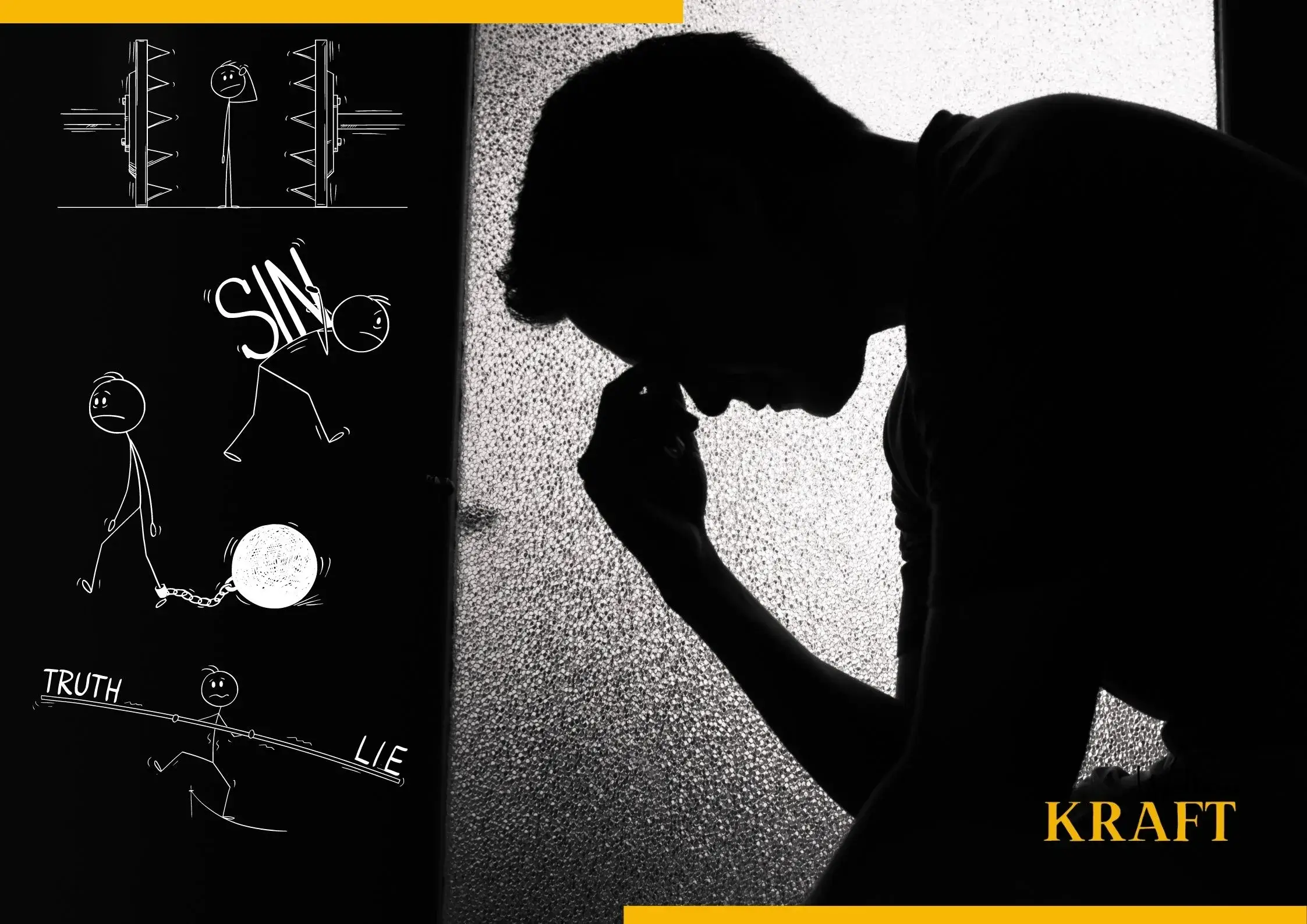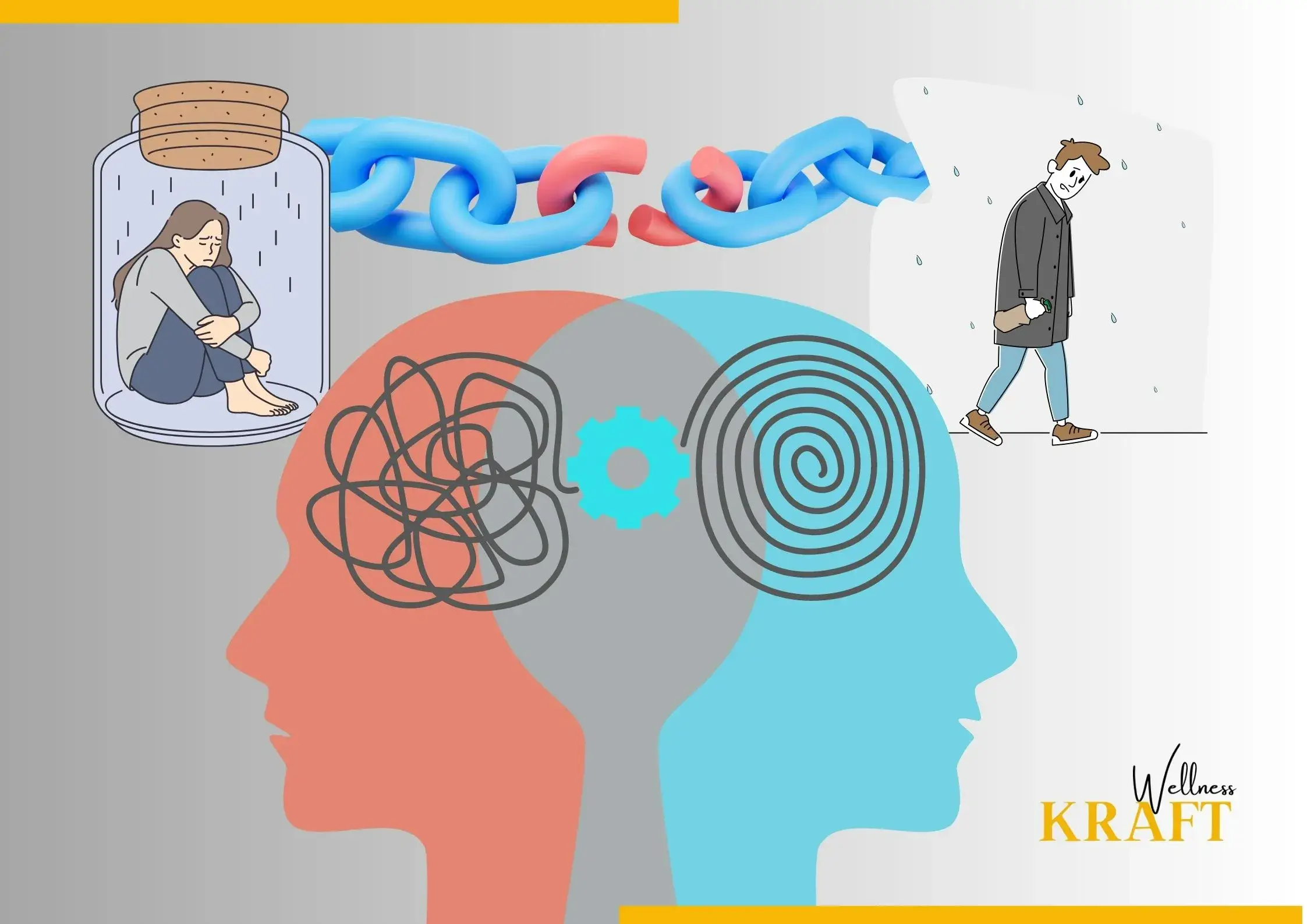“Guilt is Acknowledging Actions, Learning from Mistakes, and Becoming Better version of Ourself.” – Wellness Kraft
Table of Contents
Introduction
We all have the feeling of guilt at some point in our lives. It can be caused by things like mistakes, doubts, or the feeling that you did something wrong. Even though guilt is a normal reaction to our actions, it’s important to deal with it well to keep our mental health. In this article, we’ll talk about techniques and strategies to reframe the situation of guilt dealing that can help people understand and get over it.
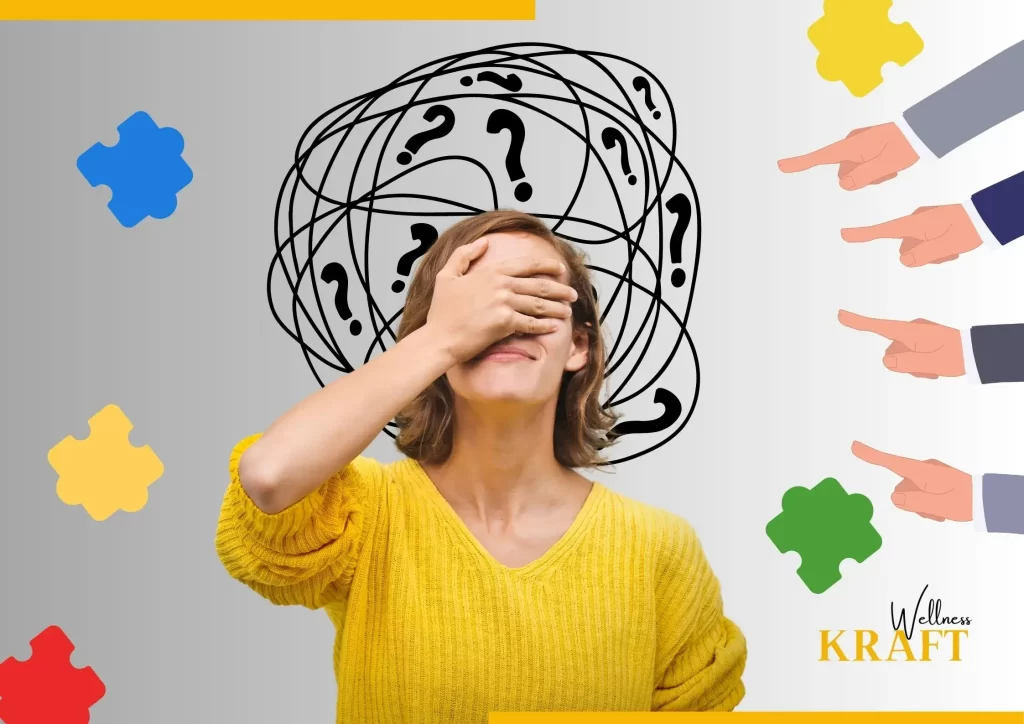
Different Types of Guilt
1. Survivor’s guilt:
It is when a person feels bad for having lived through a traumatic event or disaster when other people did not. It can make them feel like they aren’t good enough or like they should have done more to help others.
2. Parental guilt:
Parents often feel bad about their parenting choices or what they think are their flaws. They might feel bad because they don’t spend enough time with their kids, don’t meet their needs, or make mistakes in how they raise them.
3. Moral guilt:
It is the feeling someone has when they think they have broken their own moral or ethical rules. It can happen when they do things that go against their morals or beliefs, like lie, cheat, or hurt other people.
4. Relationship Guilt:
This is linked to feelings of remorse or regret in interactions with other people. It can be caused by hurting a loved one, ignoring a connection, or not meeting a partner’s or friend’s expectations.
5. Career guilt:
Some people feel guilty about their jobs, especially if they feel like they’re ignoring other important parts of their lives, like their families or their own health. They might feel bad about putting work ahead of other tasks or hobbies.
6. Self-Inflicted Guilt:
People feel guilty about themselves when they set impossible goals for themselves or talk badly to themselves. They may feel bad about themselves because they don’t do enough, don’t take care of their own needs, or compare themselves to others in a bad way.
7. Cultural or Religious Guilt:
This comes from actions or behaviors that are seen as breaking cultural or religious rules. It can happen when someone doesn’t follow certain rules, goes against religious teachings, or feels cut off from their cultural or religious group.
8. Indirect Guilt:
People in this situation feels low when they feel bad about things they couldn’t change. They might feel like they’re to blame for things they couldn’t stop or change, which can make them feel powerless and guilty.
9. Financial guilt:
This can happen when you make bad financial choices, spend too much money, or feel bad about having more money than other people. It can also happen when people feel like they aren’t taking care of their families well enough or giving enough to good causes.
10. Guilt by association:
This is when someone feels bad because they are connected to someone who has done something wrong or immoral. They might doubt their own decisions or feel responsible for what other people do.
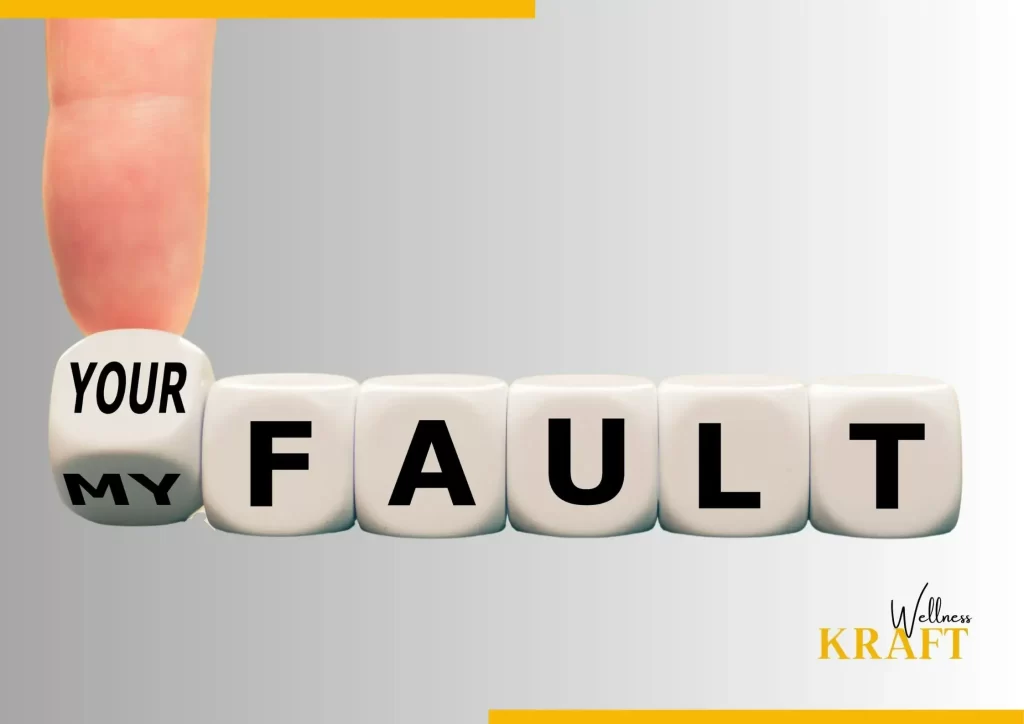
Symptoms
1. Persistent Negative Thoughts:
People who feel guilty often keep having bad thoughts about their actions or choices. They may keep thinking about the event, focusing on what they think they did wrong and feeling very bad about it.
2. Feelings of Regret:
When someone feels guilty, they often have strong feelings of regret. People may feel deep regret or sadness for what they have done and wish they could take it back or make up for their mistakes.
3. Anxiety and Restlessness:
Anxiety and restlessness can be signs of feeling low or bad. Because they are carrying guilt, people may feel constantly uneasy, on edge, or unable to calm down.
4. Low Self-Esteem:
Guilt can make a big difference in how you feel about yourself. People may have a lower sense of self-worth and think that they are flawed or not good enough to be healed and redeemed.
5. Sleep Problems:
Feeling low or bad can mess up your sleep habits and make it hard to fall asleep or stay asleep. People may have trouble sleeping or have trouble sleeping because of unwanted thoughts about their guilt.
6. Loss of Appetite or Overeating:
Guilt can make some people lose their appetite or eat too much. They might lose their hunger and find it hard to eat, or they might turn to food as a way to deal with how they feel.
7. Avoidance Behaviors:
Guilt can make people avoid or hide their feelings by doing things they don’t want to do. They might try to stay away from people, places, or things that remind them of their guilt so they don’t have to deal with their feelings.
8. Mood Swings:
Guilt can cause mood swings, where people go back and forth between being sad, irritable, and angry. Their feelings may be all over the place, going from deep regret to defensiveness and back again.
9. Physical Symptoms:
Guilt can sometimes show up as physical signs. Because guilt makes people feel bad about themselves, they may get headaches, stomachaches, muscle tightness, or other physical problems.
10. Withdrawing from society:
Feelings of guilt can make people stop talking to other people. They might stay away from friends, family, and loved ones because they are afraid of being judged or think they don’t deserve help.
Causes
1. Harming Others:
If you hurt or hurt someone physically, socially, or mentally, you might feel guilty. This could include things like lying, stealing, breaking trust, or hurting people you care about or people you don’t know.
2. Breaking Moral or Ethical Rules:
Guilt can come from going against your own moral or ethical rules. People can feel guilty when they act in a way that goes against their own morals or beliefs. This is because they are going against their own internal compass.
3. Failure to Live Up to standards:
Guilt can happen when we feel like we haven’t lived up to our own or other people’s standards. This can happen when people don’t reach their own goals, don’t meet societal or cultural standards, or don’t meet the expectations of their family, friends, or jobs.
4. Neglecting Responsibilities:
If you don’t do what you’re supposed to, you might feel guilty. This could mean not doing what needs to be done at work, not taking care of family or relationship tasks, or not keeping personal promises and obligations.
5. Survivor’s guilt:
People who live through a terrible event when others don’t may feel guilty about it. They might feel bad about being living and wonder why they were saved while others were hurt or killed.
6. Betrayal or Infidelity:
You can feel guilty if you break your partner’s trust by cheating on them or if you do other things that hurt the trust in your relationship. The person may feel guilty because they hurt their partner or broke a promise.
7. Failing to help other people:
Guilt can come from feeling like we should have helped other people when we know we could have. This can happen when people see someone in need but don’t help them.
8. Ignoring Personal Values:
People can feel guilty when they break their own rules or values. This can happen when people act in ways that go against their own values or views in order to fit in or be accepted.
9. Success or wealth:
Success or wealth can make people feel guilty or unworthy, which can make them feel guilty. People may feel guilty if they are successful while others are not, or if they have chances or advantages that others do not.
10. Not Meeting Personal Standards:
Guilt can happen when we feel like we are not meeting our own standards or goals. This self-imposed guilt can happen when a person feels they have failed in areas like their job, relationships, personal growth, or taking care of themselves.
You Can Control : 10 Proven Ways
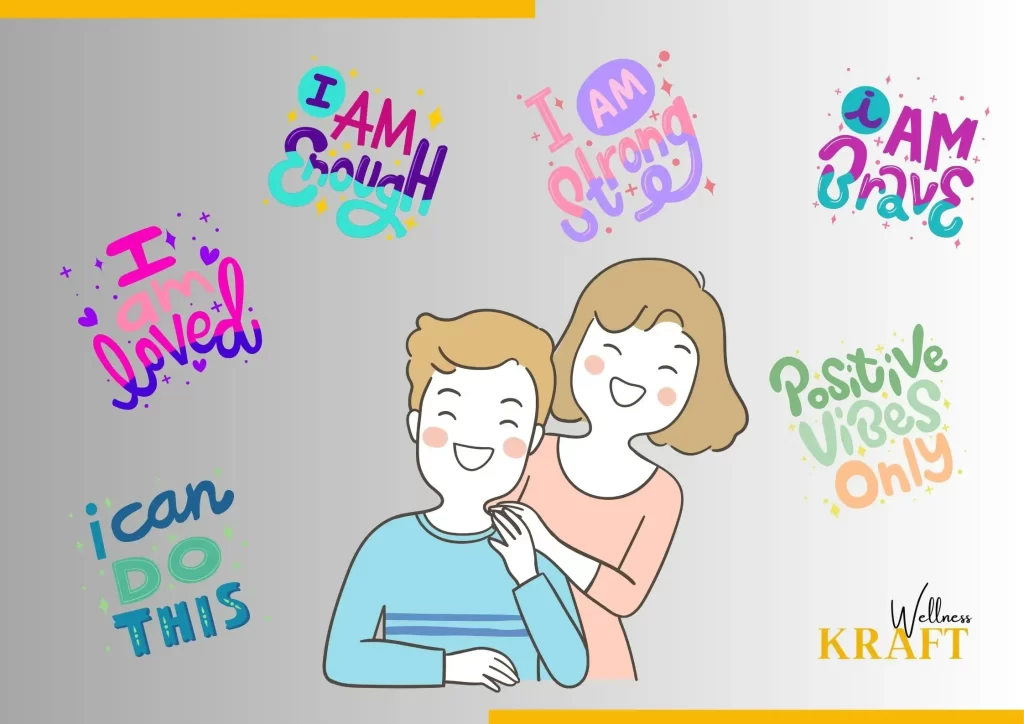
1. Recognize how you feel:
The first step in dealing with guilt is to admit that you feel guilty. Know that feeling guilty is normal and that it shows you have a moral sense. By admitting and accepting your guilt, you can start to deal with it and find a way to move on.
2. Think about the situation:
Once you’ve admitted that you’re guilty, think about what happened that made you feel this way. Find out what you did or what you chose to do that is making you feel bad. By thinking about yourself, you can learn more about the situation and the reasons why you feel so low.
3. Learn from your mistakes:
When we make mistakes or do things we regret, we often feel guilty. Don’t dwell on your mistakes; instead, use them as chances to learn. Figure out what went wrong and how you can stop it from happening again. You can grow and change as a person if you learn from your mistakes.
4. Try to be kind to yourself:
When dealing with shame, it’s important to be kind to yourself. Know that everyone makes mistakes and that your worth as a person is not based on your guilt. Just like you would with a close friend, be kind and patient with yourself. Self-compassion helps ease the weight of guilt and makes it easier to forgive yourself.
5. Make amends:
If you feel bad because you hurt or wronged someone, think about making up for it. Reach out to the person you hurt and truly say you’re sorry. Taking responsibility for your actions and expressing true regret can help fix broken relationships and give you a sense of peace.
6. Seek support:
It can be hard to deal with guilt on your own. Reach out to friends, family members, or professionals you know who can help and guide you. Talking to other people about how you feel can give you a new viewpoint and help you learn how to deal with it in better ways.
7. Practice being aware:
Mindfulness is a great way to deal with guilt. Focusing on the present moment and letting your feelings be what they are without judging them can help you feel clear and at peace. Meditation, deep breathing techniques, and writing in a journal are all ways to increase self-awareness and lessen the intensity of guilt.
8. Expect what you can get:
Often, we feel low because we have too high of standards for ourselves. Learn to set goals and standards that are in line with what you can do. Recognizing your limits and understanding that you can’t control everything can make it less likely that you’ll feel too much guilty.
9. Give yourself a break:
Getting over guilt requires you to forgive yourself. Understand that everyone makes mistakes and that it doesn’t help to feel bad about yourself forever. Learn to accept yourself and let go of the past. Take advantage of the chance to learn, grow, and move on with a new sense of purpose.
10. Accept good changes:
Lastly, turn your guilt into something good. Use what you’ve been through to help you grow and get better. Take steps to help yourself make better decisions, form healthier habits, and build stronger relationships.
Concluding Thoughts
In conclusion, the experiences of people who have dealt with guilt in real life show how much this feeling can change our lives. Unmanaged guilt can be bad for our health in many ways, like making us feel bad about ourselves and cause us to question ourselves. It can also hurt our relationships and stop us from growing as people. But we can successfully deal with it and work toward personal growth and emotional healing if we acknowledge our feelings, think about our actions, get help, and be kind to ourselves.
Remember that it is a normal part of human being to feel guilty, but we can’t let it define us or tell us how to live. We can move forward with a renewed sense of purpose and self-forgiveness if we learn from our mistakes, make amends when we need to, and welcome the chance for positive change.
Key Takeaways
1. Recognize and accept the guilt you feel without judging it.
2. Think about what happened and learn from what you did wrong.
3. Try to be kind to yourself and realize that everyone makes mistakes.
4. If you need to, make amends to fix ties.
5. Ask people you know or professionals for help.
6. Practice mindfulness to become more self-aware and lessen the intensity of sorrow.
7. Set reasonable goals for yourself.
8. Let go of the past and forgive yourself.
9. Use your guilt to make good changes and grow as a person.
10. Take advantage of the chance to learn, grow, and move on with a new sense of purpose.
FAQs
1. What is Guilt?
It is an emotional reaction that comes from feeling responsible for something you did wrong or didn’t do as you were supposed to.
2. Why do people feel guilty?
Guilt can come from doing something that hurts someone else, going against your own values, ignoring your responsibilities, or not living up to your own standards.
3. Is it normal to feel guilty?
Yes, it is a normal feeling that almost everyone has at some point. It is part of our sense of right and wrong and helps us understand how our acts affect other people.
4. How can guilt hurt your mental health?
It can cause anxiety, low self-esteem, trouble sleeping, and affect your general mental health.
5. How do I deal with guilt?
To deal with it, you need to recognize and accept your feelings, think about what happened, make amends if you need to, get help, and be kind to yourself.
6. Should I say I’m sorry for feeling bad?
It’s not necessary to say sorry for feeling bad. Instead, you should focus on fixing the actions or habits that led to the guilt and taking the right steps to make things right.
7. What effects does guilt have on relationships?
It can put a strain on relationships. It could lead to problems with trust, trouble communicating, and mental distance between the people involved.
8. Can guilt be helpful?
Yes, it can be helpful if it pushes people to learn from their mistakes, make good changes, and take responsibility for what they did.
9. When should I get help from a professional?
If you feel like you can’t get rid of your guilt or it’s getting in the way of your daily life, it might help to talk to a mental health professional or psychologist.
10. Can you get over feeling guilty?
Yes, you can get over it. With self-reflection, self-compassion, and a positive approach to making amends and growing as a person, a person can work to get rid of guilt and heal emotionally.
